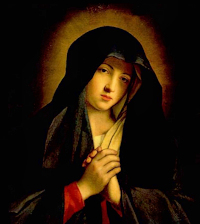Ordinary Time: September 15th
Memorial of Our Lady of Sorrows
Entrance Antiphon, Cf. Lk 2:34-35:
Simeon said to Mary: Behold, this child is destined for the ruin and rising of many in Israel, and to be a sign of contradiction; and your own soul a sword will pierce.
Gospel Verse:
Blessed are you, O Blessed Virgin Mary; without dying you won the martyr’s crown beside the cross of the Lord.
Preface I of the Blessed Virgin Mary:
It is truly right and just, our duty and our salvation,
always and everywhere to give you thanks,
Lord, holy Father, almighty and eternal God,
and to praise, bless, and glorify your name
on the feast day of the Blessed ever-Virgin Mary.
For by the overshadowing of the Holy Spirit
she conceived your Only Begotten Son,
and without losing the glory of virginity,
brought forth into the world the eternal Light,
Jesus Christ our Lord.
Through him the Angels praise your majesty,
Dominions adore and Powers tremble before you.
Heaven and the Virtues of heaven and the blessed Seraphim
worship together with exultation.
May our voices, we pray, join with theirs
in humble praise, as we acclaim:
Communion Antiphon, Cf. 1 Pt 4:13:
Rejoice when you share in the sufferings of Christ, that you may also rejoice exultantly when his glory is revealed.
The liturgy of the Mass also includes the option to recite or sing the Sequence, Stabat Mater before the Gospel.
Today is the Memorial of Our Lady of Sorrows. Devotion to the Seven Sorrows of Our Lady has its roots in Sacred Scripture and in Christian piety, which always associates the Blessed Mother with her suffering Son. Today's feast was introduced by the Servites in order to intensify devotion to Our Lady's Sorrows. In 1817 Pius VII—suffering grievously in exile but finally liberated by Mary's intercession—extended the feast to the universal Church.
Our Lady of Sorrows This feast dates back to the 12th century. It was especially promoted by the Cistercians and the Servites, so much so that in the 14th and 15th centuries it was widely celebrated throughout the Catholic Church. In 1482 the feast was added to the Missal under the title of "Our Lady of Compassion." Pope Benedict XIII added it to the Roman Calendar in 1727 on the Friday before Palm Sunday. In 1913, Pope Pius X fixed the date on September 15. The title "Our Lady of Sorrows" focuses on Mary's intense suffering during the passion and death of Christ. "The Seven Dolors," the title by which it was celebrated in the 17th century, referred to the seven swords that pierced the Heart of Mary. The feast is like an octave for the birthday of Our Lady on September 8th.
This feast dates back to the 12th century. It was especially promoted by the Cistercians and the Servites, so much so that in the 14th and 15th centuries it was widely celebrated throughout the Catholic Church. In 1482 the feast was added to the Missal under the title of "Our Lady of Compassion." Pope Benedict XIII added it to the Roman Calendar in 1727 on the Friday before Palm Sunday. In 1913, Pope Pius X fixed the date on September 15. The title "Our Lady of Sorrows" focuses on Mary's intense suffering during the passion and death of Christ. "The Seven Dolors," the title by which it was celebrated in the 17th century, referred to the seven swords that pierced the Heart of Mary. The feast is like an octave for the birthday of Our Lady on September 8th.
—Excerpted from Our Lady of Sorrows by Fr. Paul Haffner (Inside the Vatican, September 2004)
This feast is dedicated to the spiritual martyrdom of Mary, Mother of God, and her compassion with the sufferings of her Divine Son, Jesus. In her suffering as co-redeemer, she reminds us of the tremendous evil of sin and shows us the way of true repentance. May the numerous tears of the Mother of God be conducive to our salvation; with which tears Thou, O God, art able to wash away the sins of the whole world.
As Mary stood at the foot of the Cross on which Jesus hung, the sword of sorrow Simeon had foretold pierced her soul. Below are the seven sorrows of Mary:
- The prophecy of Simeon, (Luke 2:25-35)
- The flight into Egypt, (Matthew 2:13-15)
- Loss of the Child Jesus for three days, (Luke 2:41-50)
- Mary meets Jesus on his way to Calvary, (Luke 23:27-31; John 19:17)
- Crucifixion and Death of Jesus, (John 19:25-30)
- The body of Jesus being taken from the Cross (deposition from the Cross), (Psalm 130; Luke 23:50-54; John 19:31-37)
- The burial of Jesus, (Isaiah 53:8; Luke 23:50-56; John 19:38-42; Mark 15:40-47)
Symbols: heart pierced with a sword; heart pierced by seven swords; winged heart pierced with a sword; flowers: red rose, iris (meaning: "sword-lily"), cyclamen.

No comments:
Post a Comment